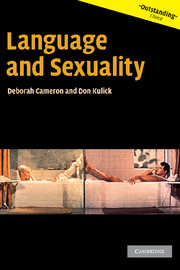Book contents
- Frontmatter
- Contents
- Preface
- 1 Making connections
- 2 Talking sex and thinking sex : the linguistic and discursive construction of sexuality
- 3 What has gender got to do with sex? Language, heterosexuality and heteronormativity
- 4 Sexuality as identity: gay and lesbian language
- 5 Looking beyond identity: language and desire
- 6 Language and sexuality: theory, research and politics
- Notes
- Bibliography
- Index
4 - Sexuality as identity: gay and lesbian language
Published online by Cambridge University Press: 05 September 2012
- Frontmatter
- Contents
- Preface
- 1 Making connections
- 2 Talking sex and thinking sex : the linguistic and discursive construction of sexuality
- 3 What has gender got to do with sex? Language, heterosexuality and heteronormativity
- 4 Sexuality as identity: gay and lesbian language
- 5 Looking beyond identity: language and desire
- 6 Language and sexuality: theory, research and politics
- Notes
- Bibliography
- Index
Summary
In the previous chapter we examined the relationship between gender and sexuality as it is played out in language-use among heterosexual men and women. We placed our discussion in the context of the arguments advanced by both feminists and queer theorists, according to which compulsory heterosexuality/heteronormativity is a structural principle that organizes sexuality in general. If that argument is accepted, it makes sense for researchers of sexuality to be interested in the behaviour of heterosexuals as heterosexuals – that is, not just as generic representatives of their gender categories. Nevertheless, it is relatively unusual to find linguistic researchers explicitly addressing questions about language and heterosexuality. Far more commonly, interest has focused on the linguistic manifestations of homosexuality. For almost a century, social scientists, including sociologists and psychologists as well as linguists, have debated whether homosexuals use language in ways that differentiate them from heterosexuals. That ongoing debate is the topic of this chapter, and our discussion of it will pay attention to two issues in particular.
One, continuing the discussion begun in the last chapter, is the issue of gender. Debates on whether homosexuals have a distinctive language are related to gender in two ways. First, the arguments have tended to be (overtly or covertly) about gay men far more than about lesbians. In scholarship as in popular culture, ideas about how gay men sound or speak are much more salient and widespread than are ideas about how lesbians sound or speak.
- Type
- Chapter
- Information
- Language and Sexuality , pp. 74 - 105Publisher: Cambridge University PressPrint publication year: 2003
- 2
- Cited by



